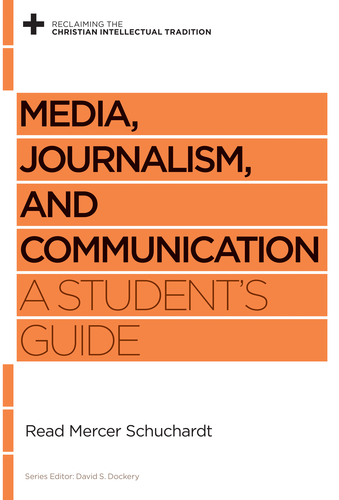A Brief Book Notice from Books at a Glance
In an age of accelerating information and increasing technology, media matters more now than ever.
In this book, Read Mercer Schuchardt helps us navigate the digital age from a distinctly Christian perspective, offering guidance for becoming wise users of media rather than simply being used by media. Highlighting the importance of studying and understanding communication arts and how they are changing, this book will help you think creatively about using media effectively for the sake of the gospel, the church, and the world.
About the Author
Read Mercer Schuchardt (PhD, New York University) is associate professor of communication at Wheaton College. He earned his doctorate under the invitation of the late Neil Postman at NYU’s Media Ecology program. He is also a member of the Media Ecology Association and the International Jacques Ellul Society. Schuchardt is a contributor to several books on communication and media theory, is the editor of You Do Not Talk About Fight Club, and the co-founder and editorial chair of the online journal Second Nature. He and his wife, Rachel, have ten children.
Endorsements
Douglas Groothuis, Professor of Philosophy, Denver Seminary; author, The Soul in Cyberspace:
Schuchardt admirably integrates the history and philosophy of technology with a rich understanding of Christianity. With McLuhan and Postman in one hand and the Bible and Christian history in the other, he offers a thoughtful and challenging perspective on journalism and media today.
Terry L. Johnson, Senior Minister, Independent Presbyterian Church of Savannah; author, The Family Worship Book; Worshipping with Calvin; and Serving with Calvin:
Read Schuchardt has been doing groundbreaking work in the new academic field of media ecology. Like his mentor, Neil Postman, he is asking us to think critically about the impact that new technology is having on everything from human development to political discourse to spiritual formation. This is an important book that is a must-read for serious Christians. I highly recommend it.
Arthur W. Hunt III, Professor of Communications, The University of Tennessee, Martin:
Read Schuchardt’s progenitor is Marshall McLuhan, whose pithy style he so well channels. I once observed Read in the classroom as students both giggled and squirmed in their seats. They giggled because they were overjoyed that someone understood their world. They squirmed because he put his finger on what they had not yet perceived about the digital age. For the student of communication there is gold to be found in this hill of wise counsel.
Brantly Millegan, Founder and Editor in Chief, ChurchPOP:
Read Schuchardt shaped the way I think about technology more than anyone else. With technology changing at an ever-increasing pace, Schuchardt is a sure guide to not only keeping your sanity but also your soul, whichever side of the Tiber you’re on.
T. David Gordon, Professor of Religion and Greek, Grove City College, Grove City, Pennsylvania:
Schuchardt’s Media, Journalism, and Communication is a publisher’s nightmare and a reader’s dream. It fits no preestablished publishing category, because it is entirely too insightful to do so; its wine will not fit those wineskins. If Marshall McLuhan had been intelligible, Neil Postman a Christian, and Jacques Ellul an American, this is the book they would have coauthored (with Wendell Berry as their editor), though they would have taken ten times as many pages to have done so.
Joe Carter, Editor, The Gospel Coalition; contributor, NIV Lifehacks Bible:
Not only has Schuchardt made the case for why the communication arts are essential to the liberal arts, he convincingly explains how they can make us better humans. This is one of the most superb short books ever written on the role and effect of media, and a must-read for every Christian college student.
Mark Galli, Editor in Chief, Christianity Today:
Read Schuchardt is in the business of telling fish about the water they swim in. We ‘fish’ instinctively breathe, eat, and drink media in all forms, all the time. We hardly notice. Schuchardt helps us notice both the fascinating and alarming. Schuchardt says some crazy things about media that just happen to be true, while pointing to truths in the gospel that may strike us as crazy. It’s why he is such a good person to discuss the media water we swim in.
